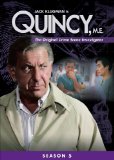| Reviews & Columns |
|
Reviews DVD TV on DVD Blu-ray 4K UHD International DVDs In Theaters Reviews by Studio Video Games Features Collector Series DVDs Easter Egg Database Interviews DVD Talk Radio Feature Articles Columns Anime Talk DVD Savant Horror DVDs The M.O.D. Squad Art House HD Talk Silent DVD
|
DVD Talk Forum |
|
|
| Resources |
|
DVD Price Search Customer Service #'s RCE Info Links |
|
Columns
|
|
|
Quincy, M.E.: Season Five
Forget the deaths―how about all that social disease? Shout! Factory has released Quincy, M.E.: Season 5, a 6-disc, 22-episode collection of the long-running NBC mystery's 1979-1980 season...although technically this is really the series' fourth season. Starring good-natured screamer Jack Klugman as the "original crime scene investigator" (as labeled on the front hardcase artwork), Quincy, M.E. by this point in its run had fully embraced a cocktail of the Universal Studios house-style mystery framework, combined with the ABC After School Special brand of social messaging...with decidedly mixed (but still entertaining) results. No extras for these beautiful full-screen transfers.
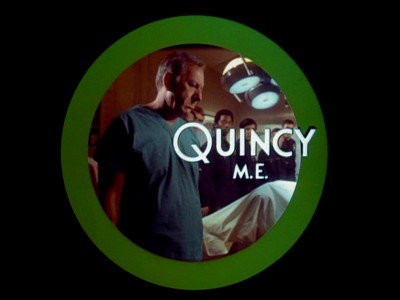
Dr. R. Quincy (Jack Klugman), the lead medical examiner in the Los Angeles County Coroner's Office, should have stayed in private practice. Ever since he went into public service, his life has been one unending series of mysterious death investigations, screaming matches with his officious, money-minded superior, Dr. Robert Astin (John S. Ragin), screaming matches with L.A.P.D. Lieutenant Frank Monahan (Garry Walberg) over late coroner reports, and screaming matches at various city council meetings, county board hearings, medical review boards, coroner inquests, town hall meetings, PTA meetings, Fourth of July picnics, supermarket openings, school assemblies, car wash fundraisers, band concerts, and bake sales, where strong-minded Quincy has got to make people understand about the problems that are plaguing society by yelling at them quite loudly! By contrast, friends Sam Fujiyama (Robert Ito), Quincy's Zen-practicing M.E. sidekick, and restaurant/bar owner Danny Tovo (Val Bisoglio), where Quince hangs out, are calm seas of tranquility next to the volatile Quincy.
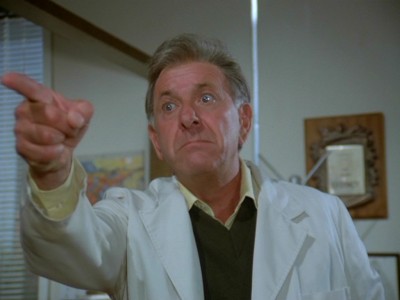
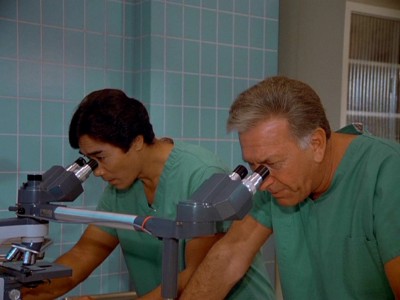
It's funny, but whenever I think of Quincy, M.E., I first picture SCTV's Joe Flaherty, who used to do a hilarious parody of the show, decked out as Klugman with a huge shock of greying hair and eyes screwed up tight as he growled and howled and screamed in agony. I'm sure I haven't seen the show since it originally aired, but I remember Quincy (does anyone ever add the M.E.?) with fondness, primarily because it starred Klugman, one of my all-time favs from television. There are plenty of actors and actresses out there who, despite starring in several TV series and projects, created only one truly iconic lead TV character that the public immediately associates exclusively with that performer: James Arness with Marshal Matt Dillon; Bob Crane with Colonel Robert Hogan; Henry Winkler with Arthur Fonzerelli; Mike "Touch" Connors with Joe Mannix; Jack Webb with Sergeant Joe Friday; Redd Foxx with Fred Sanford; and the list goes on and on. However, there are really only a handful of performers who can claim two different characters on two separate shows that are equally recognizable to fans―and equally iconic: Robert Young as Father Knows Best's Jim Anderson and the same-named Marcus Welby, M.D.; Andy Griffith as The Andy Griffith Show's Andy Taylor, and the same-named Matlock; Mary Tyler Moore as The Dick Van Dyke's Laura Petrie and The Mary Tyler Moore Show's Mary Richards; James Garner as same-named Maverick and The Rockford Files; Raymond Burr as the same-named Perry Mason and Ironside; Buddy Ebsen as The Beverly Hillbillies' Jed Clampett and the same-named Barnaby Jones; Michael Landon as Bonanza's "Little" Joe Cartwright and Little House on the Prairie's Charles Ingalls. And Jack Klugman, as The Odd Couple's Oscar Madison, and the same-named Quincy, M.E. (let me know if you think I left someone out here...).
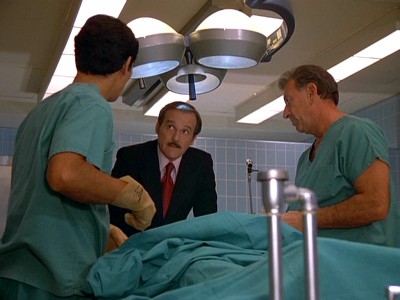
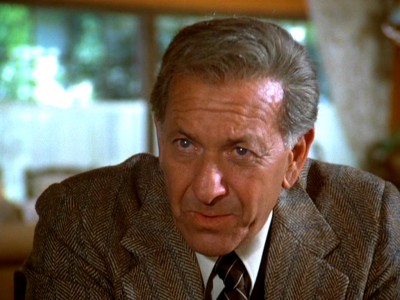
Low-rated The Odd Couple, which was perennially on the cancellation chopping block during its five year run on ABC, didn't really receive iconic status until it was re-run endlessly in syndication during the 1970s and early 1980s. The animated, energetic Klugman, who always enjoyed a healthy "Q Rating" with the public, moved right from The Odd Couple's 1975 cancelation into NBC's rotating anthology wheel, The NBC Sunday Mystery Movie, which premiered in 1971 and which featured during the previous 1975-1976 season alternating 90-minute "movies" from once-a-month series Columbo, McCloud, McMillan and Wife (soon to be sans and Wife when Susan Saint James left), and McCoy, starring Tony Curtis. The Mystery Movie anthology's final season during 1976-1977 saw Quincy, M.E. replace the unpopular McCoy that fall, and, following good reviews and a slight uptick in the Mystery Movie ratings, garner a pick-up for a regular weekly series run that February, 1977 (Quincy, M.E.'s replacement on the Mystery Movie wheel, Art Carney's Lanigan's Rabbi, couldn't stop the Mystery Movie's slide against powerhouse The ABC Sunday Night Movie; the anthology was canceled at the end of the season). Quincy, M.E. went on for a healthy seven year run (during a disastrous ratings period for NBC, and despite never having cracked the Nielsen Top Thirty), ending in 1983.
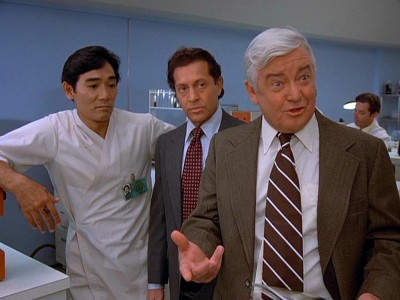
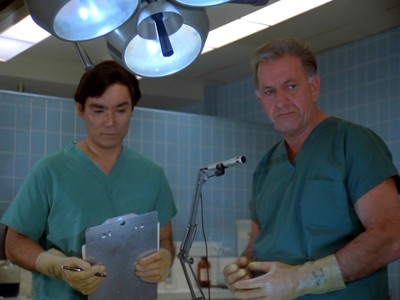
Even though this is technically the series' fourth, not fifth season (the DVD releases, rather strangely, counted those first 4 Mystery Movie episodes in the fall of 1976 as the show's first season, and the 13 episodes in the spring of 1977 as season two, with Shout! Factory continuing with this skewed numbering), you can tell that the makers of Quincy, M.E. were in that hyper-professional (and some might say mechanical) 1970s Universal Studios television groove here, knocking out a generically entertaining, formulaic mystery drama week after week, with minimal fuss or muss. Most of the episodes follow a predictable pattern―some kind of anomaly during an autopsy catches Quincy's eye, leading him to rail against the ignorance behind the social ill that helped contribute to the victim's death―with few or any extraneous additions. Location shooting is kept to a minimum, most of the scenes are shot on interior sets, and we stay largely with Quince at the lab or at Danny's or various anonymous offices and hospitals and schools. Quincy hardly ever seems to go anywhere, nor does he date much. He does take an active part in the investigations of his various autopsies (which are charmingly innocent and bloodless―we never even see the bodies!―when compared with the visceral, gory procedurals that now laughingly pass for "family viewing" on television today). And while I seriously doubt this is how real-life coroners work―like some microscope-wielding Mannix―you have to have a TV coroner do something besides cleaning petrie dishes, so....
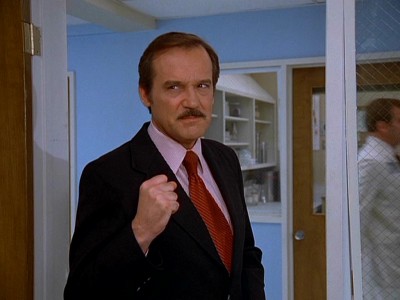
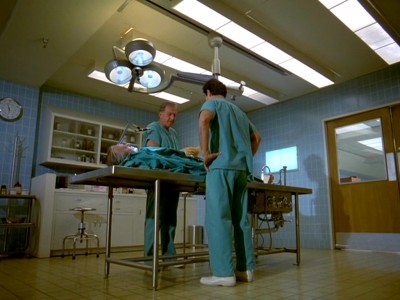
As my lengthy Odd Couple reviews attest, I'm a huge fan of Klugman's comedic skills, and while he was also an accomplished dramatic actor...there is something undeniably amusing about seeing the wired Klugman switch back and forth between Quincy's three or four basic line deliveries here. Klugman goes from his explosive fast-burn irritation whenever Quincy is denied vacation time or given more work to do, to the quiet, respectful, assured Quincy when he's performing autopsies or gently grilling grieving family members. Then, the big-smiling, laughing Klugman comes out whenever Quincy wraps up a case by celebrating at Danny's restaurant...right after the frankly hammy (not meant as a pejorative) Klugman goes into full hectoring, yelling Quincy mode, lecturing clueless bureaucrats, venal businessmen, and naive parents on various social problems as he jabs his finger in their faces, threatening collective cultural Armageddon if they don't heed his advice.
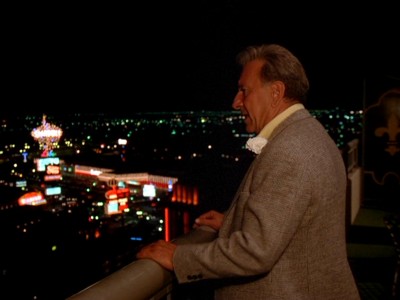
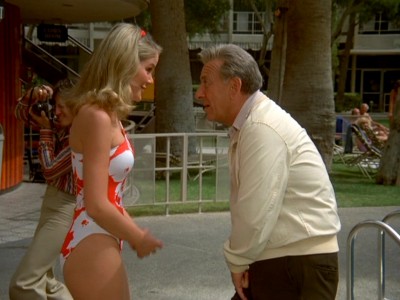
Since this was 1979, during the final end days of the disastrous Carter term, the government is the most frequent stumbling block thrown up in Quincy's path; amusingly, though, as with most liberal-oriented entertainment such as this, Quincy's answer to teen drinking, illegal chemicals, teen runaways, elderly abuse, prison reform, incompetent doctors, and pill-popping gymnasts is always...more government! According to Quincy, M.E., if there were only more government oversight committees, more departments, more programs, and especially more money thrown at our problems, they would magically disappear (a way of thinking that was wrong back in '79, and which has turned into a tragic, laughably sick joke today). Back during a time when the "Big Three" networks (there were only three) operated out of genuine fear of offending their audiences (instead of perversely alienating them like today), along with refusing to show any blood and guts here, no argument is too strong to elicit a counterweight appeasement thrown in the other direction, giving these Quincy, M.E. "message" plots an appropriately 1979 "safe" vibe. Despite the tragic nature of the deaths, this is, in the end, "feel good" social education that doesn't really challenge the system or the viewer, because it's frameworked into the fantasy unreality of a fictional TV drama, where complex, unsolvable problems are solved by caring, rebel loners like Quincy. A death, an investigation, a social ill unearthed, a lecture that says things are bad...but not that bad yet so relax, and no real resolution―all neatly wrapped up in 50 minutes (For the Benefit of My Patients is the most egregious example of this, where no one explains where all the government money is going to come from to subsidize a new non-profit hospital...and vicious gang members turn into Disneyesque community organizers).
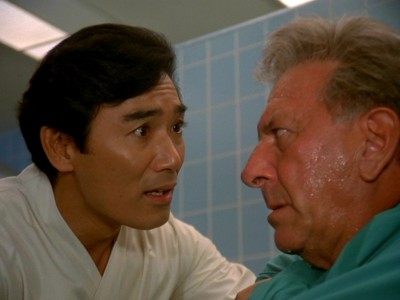
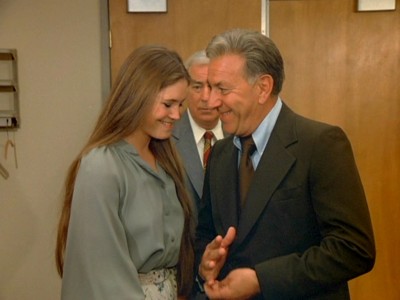
You can still enjoy the more "message-y" Quincy episodes if you focus on the slick professionalism of the series itself, and of course on Klugman, who's always watchable. When Quincy, M.E. skips (or at least tones down) the broadside billboarding, though, it's even better. Dead Last is an involved, detailed mystery right out of Dick Francis, with Quincy investigating the death of a jockey (the only full-on corpse we see this season: a horse). The Winning Edge may want to talk about speed and sports, but it's much more interesting when it looks at all the high school girls who are willing to kill for their beloved coach. The Final Gift is a straightforward, entertaining mystery about two pilots poisoned by arsenic (could have been a leftover Mannix script), while No Way to Treat a Patient feels like a fairly interesting back-door pilot for A. Martinez, Duncan Gamble, and Ana Alicia as caregivers at an inner-city emergency clinic. I'm always up for a good prison episode―no matter how stupid it is―so Riot fit the bill (I don't know what was more amusing: the ex-forger who wrote spec scripts for TV, or the battle-scarred murderers who turn into polite, observant students when Quincy lays down some irrefutable forensic logic for them). The Money Plague is a good change of location for Quincy as he heads into a small mountain town to track down some D.B. Cooper-ish money that's contaminated by anthrax (love the remarkably intact skeleton hanging from his parachute in the tree).
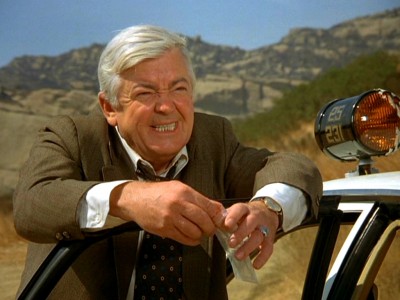
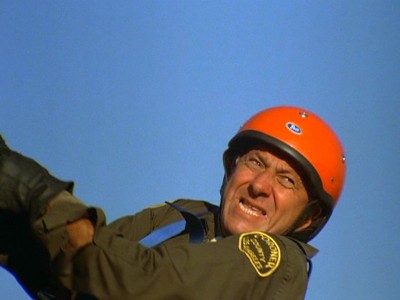
Hot Ice is the season's most comical outing, giving Klugman a lot of room to mug as he hangs around Vegas, trying to judge the "Miss Coroner" contest while going undercover as a diamond smuggler (that Kitty Ruth is a doll, and horndog Klugman sure looks like he enjoys acting with her). Cover-Up, by Michael Halperin, is a terrifically tense entry, precisely built and executed, showing a senseless death at an emergency clinic due to negligence, and the following cover-up (Klugman scores at the inquest when he blows away his detractors with cool logic). Deadly Arena is Quincy, M.E.'s bid for the already-faded 70s disaster genre, with a sweet set-up: botulism has infected a water line at the L.A. Colosseum, and people are dropping like flies. It plays just like a minor "Universal Studios disaster special" version of Klugman's big-screen disaster effort, Two-Minute Warning, with all the attendant pleasures scaled down for the small tube (isn't the episode's opening shot taken from that movie?). Finally, no Seventies TV mystery would be complete without a Bad Day at Black Rock rip-off (Mannix did two a year, easy), and Murder by S.O.P. is a most enjoyable one. Written by Robert Crais and directed by Paul Krasny, Murder by S.O.P. gets its BDABR rip-off conventions down pat, complete with a maybe-shady small town sheriff, expertly played by always-welcome John Ireland, while having a self-awareness about the plagiarism that's delightful (the victim evens says to a conspiracy theory-spouting Quincy, "This is no Bad Day at Black Rock!"). You may find some of the more obstreperous, insistent preaching and speechifying in Quincy, M.E. a little off-putting at times...but you can't denying that when it sticks to its more traditional genre roots, it's a satisfying, entertaining production.
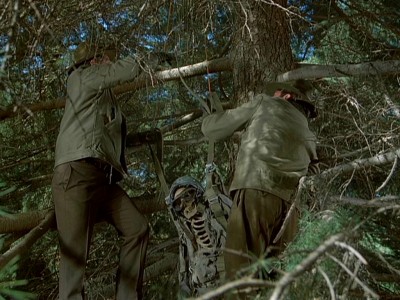
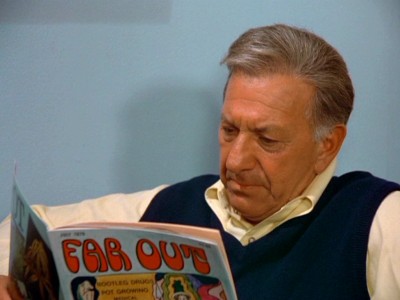
DISC 1
No Way to Treat a Flower
Quincy investigates the death of a teenager who smoked marijuana treated with a chemical that stimulates plant growth.
Dead Last
Quincy and Danny go to the track where they witness a horse going wild and killing of the jockeys. But Quincy is not so sure that the death was an accident.
By the Death of a Child
The small nation of San Christos has a new progressive president. His hold on power is fragile and he could be toppled if an American-supplied diphtheria vaccine is actually killing the children it is supposed to be saving. Quincy and Sam are sent to the country to discover the truth and save the children, if they can.
Never a Child
After performing an autopsy on a young woman, Quincy finds out about a man called "Uncle Harry" who preys on young runaway girls.
DISC 2
Hot Ice
Customs officials want Quincy's help in catching a diamond-smuggling ring when a courier they were following is killed.
Sweet Land of Liberty
A policeman is killed while on a routine visit. The killer turns out to be a dear friend of Sam's.
Made of Death
Quincy investigates the death of an evangelist, whose church is being investigated by the government.
Nowhere to Run
After a young pregnant woman falls off a cliff during a struggle with her boyfriend, the young man is suspected of killing her. Quincy suspects that the girl may have committed suicide.

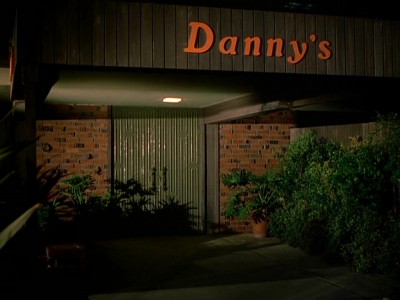
DISC 3
The Money Plague
While hiking, a forest ranger finds money believed to be the payoff for a hijacker who used a vial of anthrax to hijack a plane. Quincy and Sam go to investigate.
For the Benefit of My Patients
Quincy is stunned when he discovers that a hospital has turned away a dying man because he has no insurance.
Murder by S.O.P.
On his way to a Forensic Pathologist convention in Sacramento, Quincy is trying to stay awak by sticking his head out of the window...and is taken into custody by a small-town sheriff "for his own good."
Honor thy Elders
After Quincy traces an old man's death to physical abuse at the hands of his own son, he is faced with a similar case involving the exploitation of two elderly women by their unscrupulous nephew.
DISC 4
Diplomatic Immunity
The ruler of a small South American country comes to America for some urgent medical treatment.
Riot
Quincy and Sam are called to a prison to help investigate the murder of one of the inmates. But shortly thereafter, they find themselves held hostage during a prison riot!
Cover-Up
A nurse seeks help from Quincy when a heart attack victim dies at the medical center where she works...and her bosses want her help in covering it up.
Unhappy Hour
Dr. Asten's niece is involved in a car accident while drunk. It is up to Quincy to establish whether she or her friend, who died in the crash, was the driver of the car.
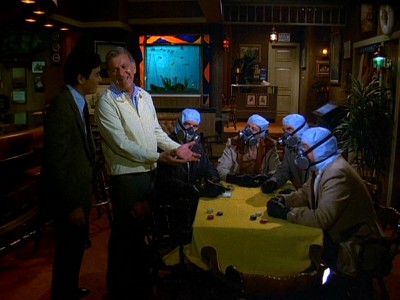
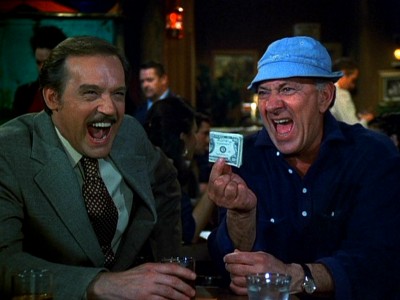
DISC FIVE
The Winning Edge
While investigating the sudden death of a high school gymnast, Quincy begins to suspect that the teacher was giving the students more than just coaching and advice.
New Blood
Asten forces Quincy to take some vacation time. He brings in a temp, Dr. McCracken, a pathologist rather than a Medical Examiner. That day, the body of a controversial congressman is found in his own office. With mounting pressure from the press and police, Quincy is convinced that McCracken will not do a thorough enough job and steps in.
TKO
Two days after winning a championship, a young boxer collapses and dies. At the same time, Danny's chef, Alfredo, goes to a cheap doctor for a hernia operation and he dies suddenly, as well. Quincy's investigations lead to a connection between the two.
DISC SIX
The Final Gift
Two Korean war buddies of Quincy', Charlie and Max, are involved in an accident in on of their company planes, and Max dies in the hospital. The police think that Charlie could have killed his partner because a large company wanted to buy them out.
Deadly Arena
Three deaths due to food poisoning are linked to a football stadium, where a big championship game--with 90,000 spectators--is due to take place.
No Way to Treat a Patient
A young physician may lose his license over his alleged mishandling of a gunshot victim.
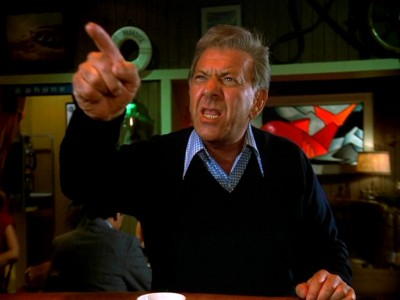
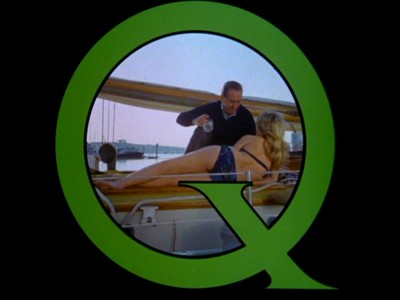
The DVD:
The Video:
Super-sharp. The full-screen, 1.37:1 transfers for Quincy, M.E.: Season 5 look terrific, with beautiful color, a razor-sharp image, and no imperfections that I could spot. Solid job.
The Audio:
The Dolby Digital English split mono audio track is fine, with no hiss and a decent re-recording level. No closed-captions or subtitles available.
The Extras:
No extras for Quincy, M.E.: Season 5.
Final Thoughts:
When Quincy yells at you...you'll wish you were already dead. The ABC After School Special aspect of these social message-y Quincy episodes can crack you up with their earnest, one-sided liberalism (followed quickly by an equivocation so as not to offend the other half of the audience). However, there's no doubt these are entertaining, slickly-produced mysteries, with the affable Klugman easily keeping us coming back for more. I'm recommending Quincy, M.E.: Season 5.
Paul Mavis is an internationally published movie and television historian, a member of the Online Film Critics Society, and the author of The Espionage Filmography.


|
| Popular Reviews |
| Sponsored Links |
|
|
| Sponsored Links |
|
|
| Release List | Reviews | Shop | Newsletter | Forum | DVD Giveaways | Blu-Ray | Advertise |
|
Copyright 2024 DVDTalk.com All Rights Reserved. Legal Info, Privacy Policy, Terms of Use,
Manage Preferences,
Your Privacy Choices | |||||||









